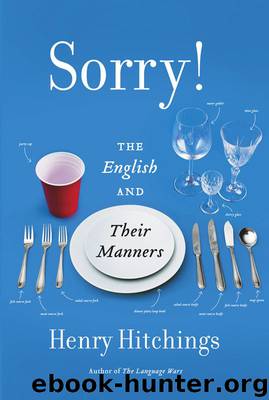Sorry!: The English and Their Manners by Hitchings Henry

Author:Hitchings, Henry [Hitchings, Henry]
Language: eng
Format: epub
Publisher: Farrar, Straus and Giroux
Published: 2013-11-05T00:00:00+00:00
15
The Englishness of English manners
Edmund Burke, an admirer of Fanny Burney’s books, was instrumental in getting her released from her confinement, and his own brushes with monarchy, less intimate than hers, informed some of the most quotable words ever written about manners.
In 1790 Burke, established as a first-class orator and political thinker, published his Reflections on the Revolution in France. There he recalled seeing Marie Antoinette in her pomp at Versailles: ‘just above the horizon, decorating and cheering the elevated sphere she just began to move in’. At one time ‘ten thousand swords must have leaped from their scabbards to avenge even a look that threatened her with insult’. Now, though, ‘the age of chivalry is gone’, and ‘that of sophisters, economists and calculators has succeeded; and the glory of Europe is extinguished for ever. Never, never more, shall we behold that generous loyalty to rank and sex, that proud submission, that dignified obedience, that subordination of the heart, which kept alive, even in servitude itself, the spirit of an exalted freedom. The unbought grace of life, the cheap defence of nations, the nurse of manly sentiment and heroic enterprise is gone!’1
For Burke, Marie Antoinette was the embodiment of civility. Her degradation was the mark of what he would six years later condemn as a ‘coarse, rude, savage’ new order. The French revolutionaries were desecrating the very principles of mannerliness: a regard for monarchy, religion and rank, and a deference to women. ‘Manners,’ wrote Burke, ‘are of more importance than laws. Upon them, in a great measure the laws depend. The law touches us but here and there, and now and then. Manners are what vex or sooth, corrupt or purify, exalt or debase, barbarize or refine us.’ They achieve this by a ‘constant, steady, uniform, insensible operation, like that of the air we breathe in. They give their whole form and colour to our lives.’ At their best ‘they aid morals’; at their worst ‘they totally destroy them’.2
Burke regarded a system of manners as a means of preserving political, social and commercial stability. When the traditional structures of society were overthrown, as by the French Revolution, manners also unravelled. Burke argues that what passes for egalitarianism is in fact a brutish stripping away of the architecture of civility. His thinking has played a large part in shaping conservative notions of Englishness. ‘In England,’ he writes, ‘we preserve the whole of our feelings still native and entire … We have real hearts of flesh and blood beating in our bosoms. We fear God; we look up with awe to kings; with affection to parliaments; with duty to magistrates; with reverence to priests; and with respect to nobility. Why? Because when such ideas are brought before our minds, it is natural to be so affected; because all other feelings are false and spurious.’ He imagines the English as a huge family with deep roots, and English society as ‘a partnership not only between those who are living, but between those who are living, those who are dead, and those who are to be born’.
Download
This site does not store any files on its server. We only index and link to content provided by other sites. Please contact the content providers to delete copyright contents if any and email us, we'll remove relevant links or contents immediately.
| Archaeology | Essays |
| Historical Geography | Historical Maps |
| Historiography | Reference |
| Study & Teaching |
Underground: A Human History of the Worlds Beneath Our Feet by Will Hunt(11261)
Navigation and Map Reading by K Andrew(4555)
Sapiens by Yuval Noah Harari(4540)
Barron's AP Biology by Goldberg M.S. Deborah T(3633)
The Sympathizer by Viet Thanh Nguyen(3485)
5 Steps to a 5 AP U.S. History, 2010-2011 Edition (5 Steps to a 5 on the Advanced Placement Examinations Series) by Armstrong Stephen(3406)
Three Women by Lisa Taddeo(2921)
The Comedians: Drunks, Thieves, Scoundrels, and the History of American Comedy by Nesteroff Kliph(2791)
Water by Ian Miller(2587)
Drugs Unlimited by Mike Power(2194)
DarkMarket by Misha Glenny(1847)
The House of Government by Slezkine Yuri(1846)
The Library Book by Susan Orlean(1738)
A Short History of Drunkenness by Forsyth Mark(1720)
Revived (Cat Patrick) by Cat Patrick(1678)
The Woman Who Smashed Codes by Jason Fagone(1650)
The House of Rothschild: Money's Prophets, 1798-1848 by Niall Ferguson(1619)
And the Band Played On by Randy Shilts(1615)
Birth by Tina Cassidy(1572)
